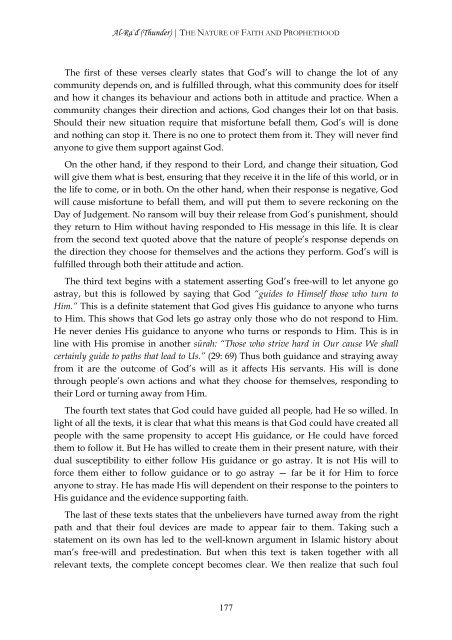Volume 10 Surah 12 - 15 - Enjoy Islam
Volume 10 Surah 12 - 15 - Enjoy Islam
Volume 10 Surah 12 - 15 - Enjoy Islam
Create successful ePaper yourself
Turn your PDF publications into a flip-book with our unique Google optimized e-Paper software.
Al-Ra`đ (Thunder) | THE NATURE OF FAITH AND PROPHETHOOD<br />
The first of these verses clearly states that God’s will to change the lot of any<br />
community depends on, and is fulfilled through, what this community does for itself<br />
and how it changes its behaviour and actions both in attitude and practice. When a<br />
community changes their direction and actions, God changes their lot on that basis.<br />
Should their new situation require that misfortune befall them, God’s will is done<br />
and nothing can stop it. There is no one to protect them from it. They will never find<br />
anyone to give them support against God.<br />
On the other hand, if they respond to their Lord, and change their situation, God<br />
will give them what is best, ensuring that they receive it in the life of this world, or in<br />
the life to come, or in both. On the other hand, when their response is negative, God<br />
will cause misfortune to befall them, and will put them to severe reckoning on the<br />
Day of Judgement. No ransom will buy their release from God’s punishment, should<br />
they return to Him without having responded to His message in this life. It is clear<br />
from the second text quoted above that the nature of people’s response depends on<br />
the direction they choose for themselves and the actions they perform. God’s will is<br />
fulfilled through both their attitude and action.<br />
The third text begins with a statement asserting God’s free-will to let anyone go<br />
astray, but this is followed by saying that God “guides to Himself those who turn to<br />
Him.” This is a definite statement that God gives His guidance to anyone who turns<br />
to Him. This shows that God lets go astray only those who do not respond to Him.<br />
He never denies His guidance to anyone who turns or responds to Him. This is in<br />
line with His promise in another sūrah: “Those who strive hard in Our cause We shall<br />
certainly guide to paths that lead to Us.” (29: 69) Thus both guidance and straying away<br />
from it are the outcome of God’s will as it affects His servants. His will is done<br />
through people’s own actions and what they choose for themselves, responding to<br />
their Lord or turning away from Him.<br />
The fourth text states that God could have guided all people, had He so willed. In<br />
light of all the texts, it is clear that what this means is that God could have created all<br />
people with the same propensity to accept His guidance, or He could have forced<br />
them to follow it. But He has willed to create them in their present nature, with their<br />
dual susceptibility to either follow His guidance or go astray. It is not His will to<br />
force them either to follow guidance or to go astray — far be it for Him to force<br />
anyone to stray. He has made His will dependent on their response to the pointers to<br />
His guidance and the evidence supporting faith.<br />
The last of these texts states that the unbelievers have turned away from the right<br />
path and that their foul devices are made to appear fair to them. Taking such a<br />
statement on its own has led to the well-known argument in <strong>Islam</strong>ic history about<br />
man’s free-will and predestination. But when this text is taken together with all<br />
relevant texts, the complete concept becomes clear. We then realize that such foul<br />
177

















